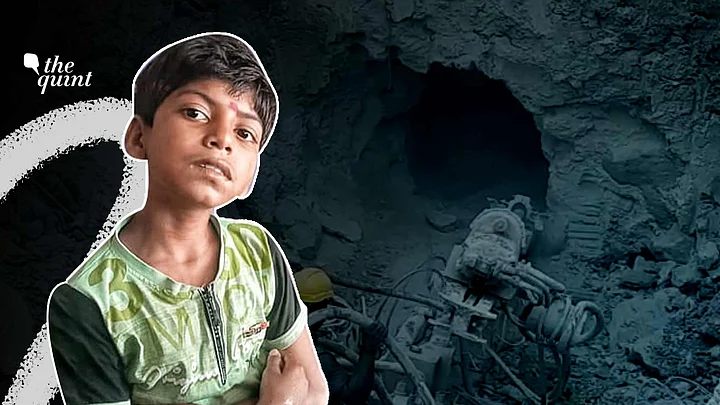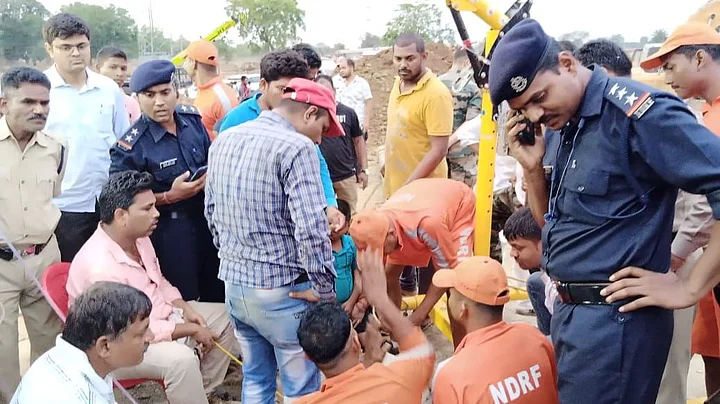"Although we hoped that he would be okay, every passing hour was a test. But my boy triumphed,” said Ram Kumar Sahu, heaving a sigh of relief after his son Rahul Sahu was rescued from inside a 60-feet-deep borewell after over 100 hours of rescue operation.
“It was one step forward, one step back," Ram Kumar added, as he described the arduous operation pulled together by teams of both the National and the State Disaster Response Forces (NDRF and SDRF), paramilitary forces, and the entire district administration.
Rahul, an 11-year-old boy with hearing and speech impairment, from Pihrid village in Janjgir-Champa district of Chhattisgarh, fell inside the borewell on 10 June. The rescue operation ended on 14 June, Tuesday, with his safe evacuation.
“It was a journey from hell and back, but I never lost hope," said Rahul's mother Geeta Sahu, holding back her tears of joy.
"I was worried because I couldn’t hold my child in my arms. He would have been terrified.”Geeta Sahu
Soon after his evacuation, Rahul was shifted to Apollo Hospital in Bilaspur, Chhattisgarh. He is currently being treated for sepsis, but doctors say he is out of any serious threat.
A Battle of Hope, Courage, and Excavation Attempts
It was Rahul’s mother Geeta who had first noticed that her child was missing. She had seen him playing with his friends a few minutes ago – and suddenly he was nowhere to be seen. She called for help even as she searched for him in their house and the vicinity. Then, they moved towards the field. As they inched closer to the fateful borewell, they heard cries – and her heart sank.
“When we heard Rahul cry, we realised that he had fallen inside the borewell. My heart missed a beat. There was a chaotic panic because Rahul could neither hear nor speak. There was no way to let him know that we were there – and that we had heard him or we would try to rescue him.”Rahul’s father Ram Kumar
As the villagers assembled, and the district administration was informed, the officials ushered in and attempts to rescue Rahul began. Initially, a manual crane was used to pull Rahul up, but there was no response from the kid.
Soon, the NDRF and the SDRF teams were roped in to get Rahul out of the pit. Soon, a camera and a sensor were installed which led them to the first glimpse of Rahul in the pool of muddied water.
- 01/02
A team of nearly 500 people was engaged in Rahul's rescue for over four days.
(Photo: By special arrangement/ The Quint)

- 02/02
(Photo: By special arrangement/ The Quint)

But it was not all that the camera picked. Along with Rahul, a snake and a frog were spotted which no one knew at the moment that they weren’t venomous. The district collector informed Chhattisgarh Chief Minister Bhupesh Baghel who had by then began overseeing the rescue operation.
Challenges Abound
Chhattisgarh's Public Health Engineering Department had informed the district magistrate that the rescue attempt would not be easy because the ground was rocky.
By Friday night, the rescue team had grown up to 500 people – with 50 machines engaged in excavation. The idea was to dig a ditch parallel to the borewell and then make a tunnel to the base of the borewell to rescue Rahul. Although there was no margin of error, this was the most appropriate technique considering past instances of people falling in borewells in India.
In July 2006, a four-year-old boy Prince fell into a borewell in Kurukshetra district in Haryana. A similar operation was carried out for over 48 hours, after which he was rescued safely. Sujith Wilson, a two-year-old boy from Tiruchirappali district in Tamil Nadu, however, was unfortunate. He couldn't be rescued from a borewell despite 72 hours of rescue efforts.
As the rescue operation progressed in Pihrid village, Rahul was continuously supplied with oxygen, bananas, and ORS. He also slept in between.
The attempts were halted, delayed, and made tougher by the giant rocks which came in the way. The excavation went on inch by inch.
By Monday noon, the rescue teams realised that the water level in the borewell had increased. The district collector of Janjgir-Champa, Jitendra Shukla, told the media that it was "frightfully high."
“I immediately ordered that all functional borewells in the village be turned on to bring this level down. NDRF personnel drained out water using a vessel tied to a rope, and we even released water from two stop dams in the area. At this point, the camera footage showed that the boy was unresponsive.”Jitendra Shukla
By Monday evening, the rescuers were positive that they would get Rahul out soon as it was sedimentary rocks to drill through.
But around 6 pm, they hit a load of Dolomite rock, which is most often blasted as it’s not viable to drill through. It this case, however, it wasn’t an option. It took the teams two hours to drill through one foot of Dolomite.
On Tuesday, 14 June, at around 6:30 pm, the team broke through. They had reached Rahul’s borewell. The snake and the frog were extricated first – and then the hole was drilled bigger for a human body. However, Rahul was still not responsive. It was decided that someone be sent inside the tunnel to get him out.
A little before midnight on Tuesday, the rescue team pulled out Rahul, he opened his eyes and was taken directly to the hospital 50 km away in Bilaspur.
He is accompanied by his mother, uncles, and aunts in the hospital, but the father remained back at home praising the lord – and his child’s courage.
“He has a will of rock. He has his difficulties but he proved to be stronger than many,” Ram Kumar Sahu said.
(At The Quint, we question everything. Play an active role in shaping our journalism by becoming a member today.)


